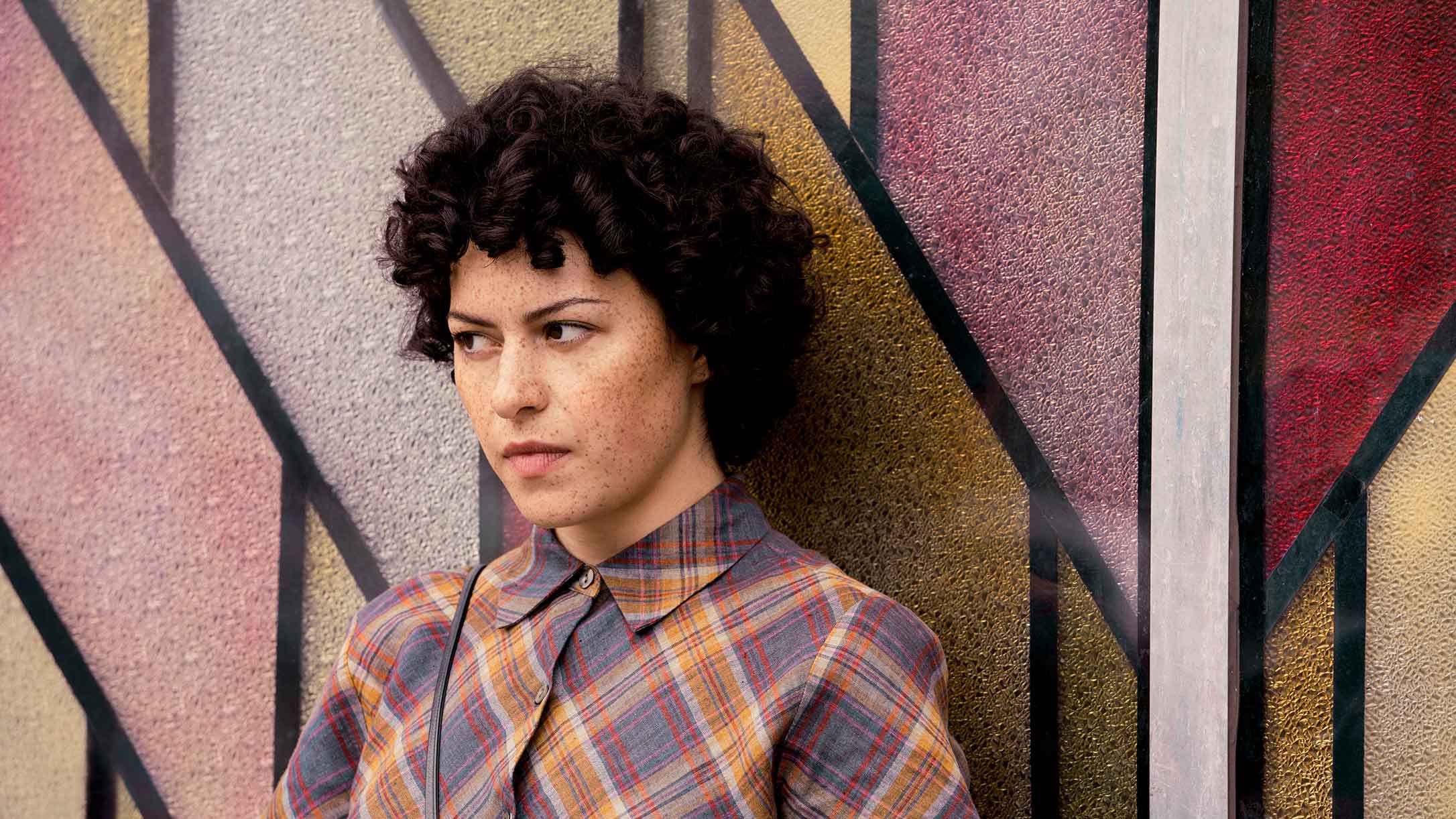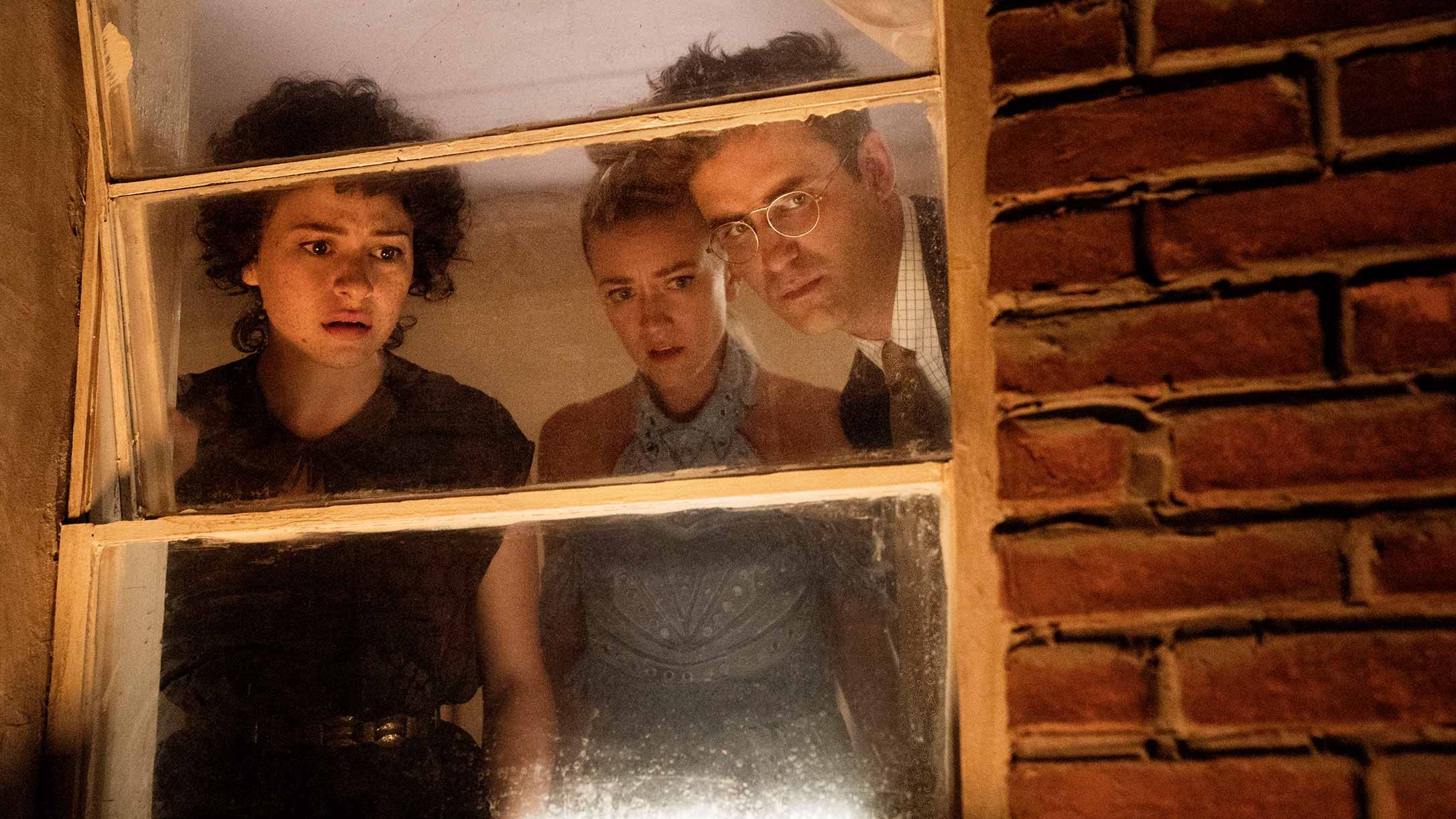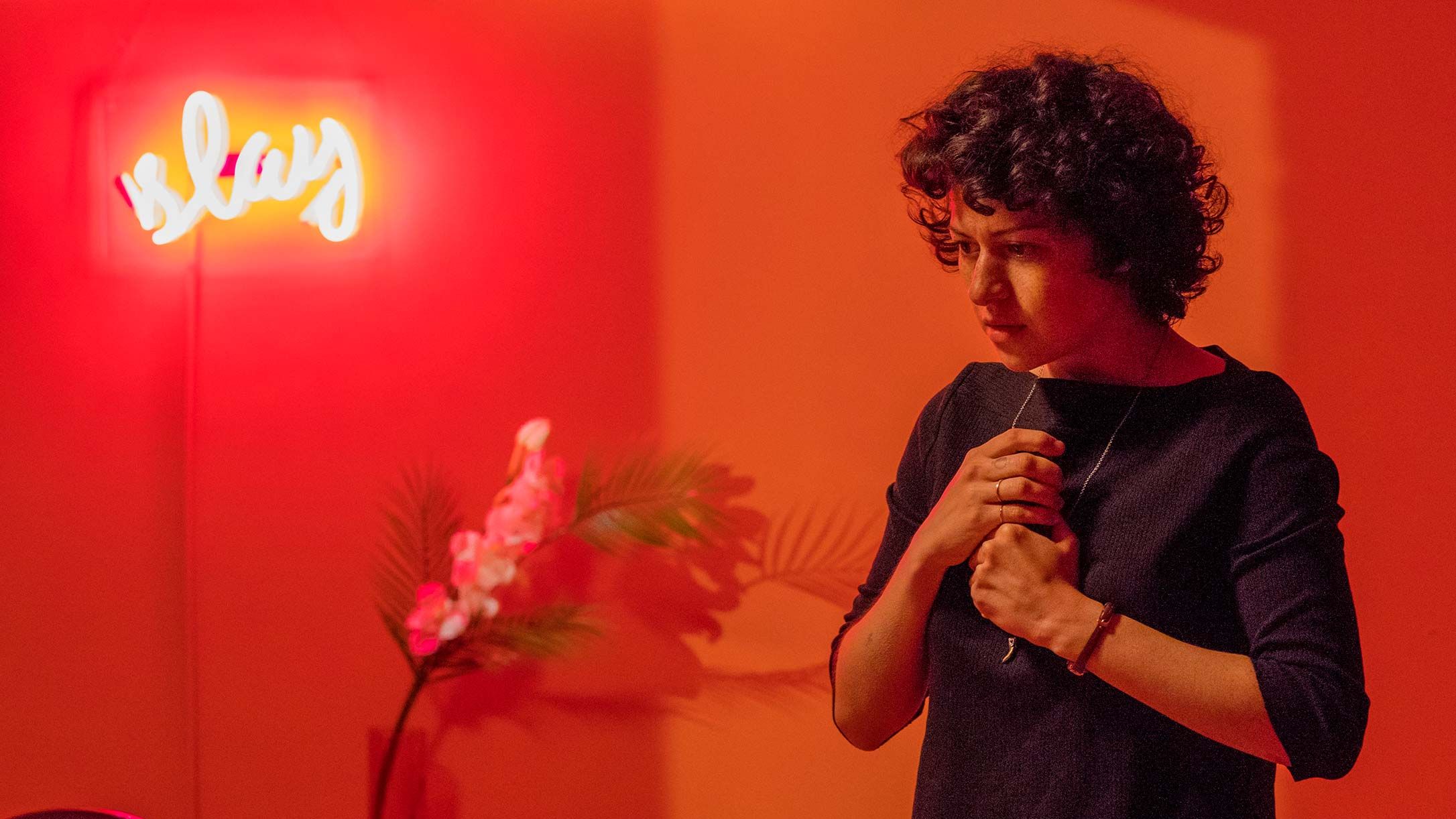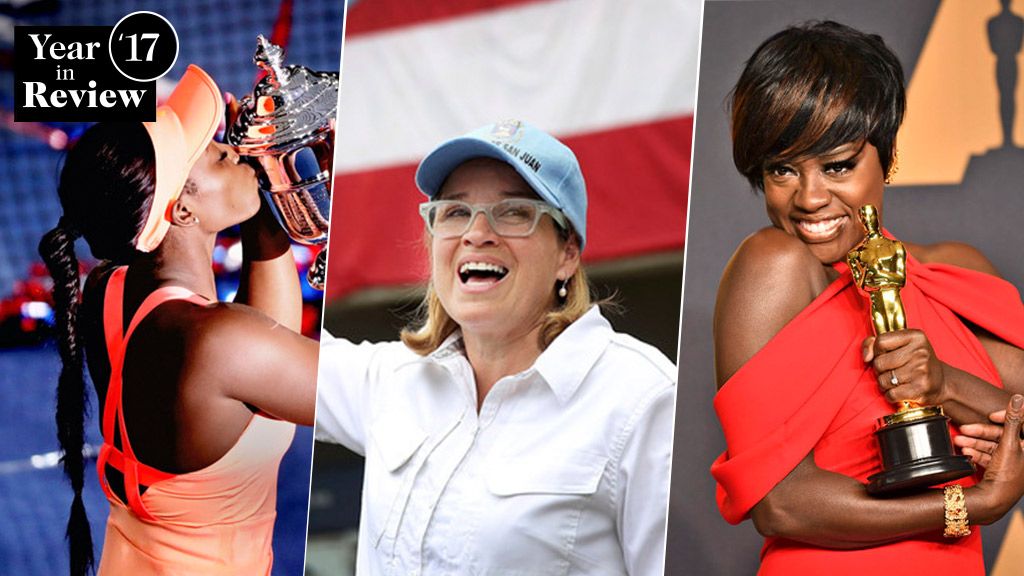Alia Shawkat on That Shocking 'Search Party' Finale and Where the Show Goes from Here
The actress/producer talks to MarieClaire.com about Search Party's heightened relevance in this post Weinstein world, and learning to say no.

You know how you become obsessed with a show during its first season, and then season two rolls around and it's just not nearly as good? Search Party isn't like that at all. This has actually been a decent year for sophomore seasons—The Crown Season 2 was even better than Season 1, Stranger Things offered up a solid second serving, and Search Party exceeded expectations that were already high.
The "millennial mystery comedy" (that's totally a category, just go with it) has always been subversive, but Season 2 takes a darker and more introspective turn, with Dory plagued by accidentally committing murder, which is compounded by the fact that all her friends hate her for dragging them into her mess. Season 2 ends with Dory killing someone else (this time very much on purpose), and MarieClaire.com spoke to Alia Shawkat about how the show will go forward now that her character has been arrested. More importantly, we spoke to Alia about Search Party's heightened relevance in this post-Weinstein world (sexual harassment is a big theme in Season 2), why Cat Person is so goddamn relatable, and learning to say no to men who always expect us to say yes.
On where will Search Party go now that Dory's been arrested for murder:
"Each season has been mocking a certain trope—the first season was 'the whodunnit mystery.' The season season was an Alfred Hitchcock-inspired panic. For the third season, an idea is that maybe it would be mocking 'the trial.' There have been so many documentaries about trials—most recently, Amanda Knox—so it would be mocking that trope."
On how she relates to Dory—and how Dory's trauma relates to the f*cked up world we live in right now:
"Am I having panic attacks all the time? Not necessarily. But there are things about Dory that I relate to. And not to make it heavy, but I think subconsciously the show has always been talking about how millennials deal with something bigger than themselves. In the second season, there's a dire reality and Dory has to deal with it—and it mirrors the world. Terrible things are happening every day and they're getting closer and closer to our front door.
"The show has always been talking about how millennials deal with something bigger than themselves."
I feel like a lot of millennials are having to wake up and say, 'Oh f*ck, we actually have to do something about it?' It's hard to start the engine, and say, 'Right, what do I do besides tweeting things?' Like, becoming aware of what you care about. Taking action on it. Doing self care, so you're actually prepared to do it. That's what I was pulling from for Dory. What is the real dread in our lives? I certainly haven't killed anyone and I don't plan on it, but what's happening in the world is as extreme—things that are so upsetting, that we hear about every day, and that we compartmentalize as though it's normal, but it's really not. We have to learn how to live a truthful life through it. It's similar to what Dory's going through."
On the sexual assault allegations sweeping Hollywood:
"It's been like this always. We always knew about Harvey Weinstein. I never even worked with the man and I knew about it. People always knew about Louis C.K. We always knew about it, but even as strong, verbal women, we were like, 'That's just how it is.' And all of a sudden when it came out publicly, people were like, 'Well, that's f*cked up,' and we were like, 'Yeah, yeah it is f*cked up.' We knew it was f*cked up and we didn't do anything about it, weirdly. But it takes the power of numbers, it takes the power of attention. And also, women who are sexually harassed to all different degrees have a hard time coming forward about it. Because they're like: Am I going to be believed? Am I going to be shamed? Is it going to effect my work? Is it going to effect my life? Maybe it's easier if I just kept going."
On the conversation around the industry over-sexualizing young actors, and her own experience with child acting:
"When I was acting as a kid, I never necessarily felt over-sexualized or put in a place where I was uncomfortable—but I felt I had to be a certain kind of person. Meaning, certain things weren't accessible to me even if I wanted them. Even if I wanted to be the romantic lead—and there were a lot of characters who were the romantic lead even though they were 13—I wasn't necessarily that role. I did a show called State of Grace where it was more through my perspective, and she's a writer, and really shy, and not sexual at all. She has a hard time speaking up for herself.
Get exclusive access to fashion and beauty trends, hot-off-the-press celebrity news, and more.
"I wanted to write and direct at a young age, but I was like, 'If that's the way they see me, if I'm going to be sexualized or have to look a certain way, I don't want to do it.'"
Looking back at Arrested Development, I'm proud of that show, but what is the main story about? That my cousin finds me attractive. Maeby is a smart character, but she's the butt of a lot of jokes. Like sitting on George Michael's lap, she's unaware that he's getting hard based on the fact that she's sitting there. A lot of the jokes were about her being sexualized without her knowing.
And then when I became 17 I didn't quit acting, but I was not auditioning. I took a break for a year and a half, where I was like: This isn't worth it to me. So, I never felt I was forced to do anything, but I felt I had to choose not to push myself to be more succesful, or be more seen, because I said, 'I'd rather not be exposed in that way than be exposed at all.' I wanted to write and direct at a young age, but I was like, 'If that's the way they're going to see me, if I'm going to be sexualized, or have to look a certain way, I don't want to do it.' It kind of held me back in a way."

On her experience as a child actor making her (and me, TBH) angry—and the relatable brilliance of Cat Person:
"It makes me so angry, too. I'm getting emotional talking about it. It's intense but at the same time this is important. But this kind of anger needs to happen. I read Cat Person [the viral New Yorker short story], and I had just been talking to a guy friend about how my therapist told me about a thing called 'Unjust Sex.' And Cat Person talked about that perfectly—I've been in that position, I think many girls have. We've all been there... When I read the story, I was like, Oh my god, this is such an insane time to be a part of. I used to think I was born in the wrong generation, but now I'm like, I was born in the exact right time, perfectly. Because it takes us learning how to be that girl in that story and saying, 'You know what? Stop. I don't like this anymore.' And to not worry about being so empathetic."
On being in that exact position—where you're hooking up and you're kind of into it, but you're kind of not, but you don't want to make it a thing so you just go through with it—and saying no:
"Before that story came out, and before all these accusations came out, I was going on dates—nice guys, no one who put me in an uncomfortable position. But one time I was making out with a guy, and we were going further, and I stopped him. I said, 'Stop, I'm sorry I'm not into this anymore.' He was like, 'Did I do something wrong? I'm so sorry.' And I said, 'No, I'm just not into it anymore, I think you should go home.' I should be able to tell a guy when I'm not attracted to him. All of this shit is infuriating for sure, and we need to be more aware that we can verbalize [discomfort] early on."

On being an actor who chooses to use her voice:
"I used to be like, I'm just an actor, that's it. But now I'm like, no, I want to be a part of this because I feel it. All the work I want to make is about female sexuality and the independence of that, and the equality of women—my work and my art are becoming very connected to how I live my life. As an artist, I think that's the best place to be—to be making art about exactly what you're feeling in order to heal from it. I'm never going to be able to take a part that's just some young ingénue the guy wants for the whole movie. I've never been able to relate to that. Before it was like, 'I'm not good enough,' or 'I don't look the right part,' or 'I guess I'll just be the ethnic friend,' or 'maybe I'll just quit acting.' But now I'm realizing, no, I had to wait. Eventually the audience would come around."
Search Party Season 2 is currently streaming on TBS.
This interview has been edited and condensed.
RELATED STORY

Mehera Bonner is a celebrity and entertainment news writer who enjoys Bravo and Antiques Roadshow with equal enthusiasm. She was previously entertainment editor at Marie Claire and has covered pop culture for over a decade.
